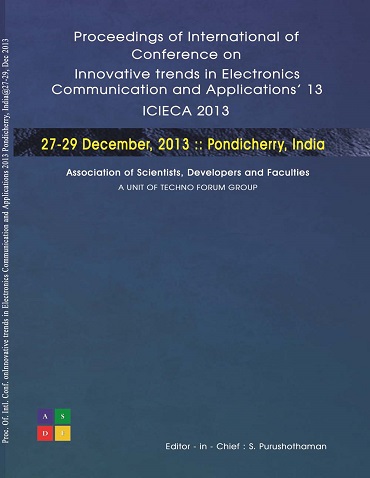- Publication Meta:Value
- Short Title:ICIECA 2013
- Publisher:ASDF, India
- ISBN 13:978-81-925233-4-7
- ISBN 10:81-925233-4-9
- Language:English
- Type:Hard Bound - Printed Book
- Copyrights:ICIECA Organizers/ [email protected]
- Editor-in-Chief:Purushothaman
- Conference Dates:27 - 29, December 2013
- Venue Country:Pondicherry, India
- Submitted Papers:58
- Acceptance Rate:15.51%
- Website:www.icieca.org
Welcome to ASDF Electronic Digital Library!
ICIECA 2013
ICIECA 2013
International Conference on Innovative trends in Electronics Communication and Applications 2013
Paper 017
Reed Solomon Coded NC-MFSK for Low Power Remote Sensing Sensor Nodes
Shanmugasundaram T A1, Alamelu Nachiappan2
1Sathyabama University, Rajiv Gandhi Salai, Chennai
2Pondicherry Engineering College, Pondicherry, India.
Abstract
Low power consumption and thus less implementation complexity should be the major design goal for RF wireless transceiver circuitry for Remote Sensing sensor nodes. WSNs are deployed to sense one or more parameters concerned to a remote environment i.e. the environment in which Human intervention is not allowed or suggested. Nodes deployed for such applications should prolong their battery life in order to avoid frequent node failure which in turn causes undesired changes in the topology of the network. As these nodes are driven into sleep mode for most of the time so as to conserve the battery power, the modulation scheme used should have quicker transition time from sleep mode to active mode. Otherwise, conservation of battery power becomes useless. As the transceiver consumes its maximum power during data transmission, the modulation scheme should be less complex to implement. Besides these, the data sequence is needed to be robust enough to withstand the interference caused by neighbouring wireless technology or devices with more power factor as well as the harsh behaviour of the channel. In order to fulfil all the requirements as mentioned above, Reed Solomon coded non-coherent M-ary Frequency Shift Keying modulation technique is proposed using Matlab / Simulink. Being Direct Digital Modulation approach, MFSK has faster transition time between sleep mode and active mode. Moreover as it is operated under non-coherent mode, there is no need of carrier phase recovery circuitry. Due to these, the transceiver circuitry becomes less complex and so reduced power consumption. The phase relationship between various signal components are plotted in terms of Eye diagram, Signal trajectory and Scatter plot. The simulation results show that, the phase relationship is clear under multipath Rayleigh and Rician fading channel conditions. But, when additive white Gaussian noise gets added with Rayleigh / Rician fading, the phase relation becomes worse. And this model gives its worst case Bit Error Rate performance around 50 to 60%.
Keywords
Author's Profile
Author profile can be generated and linked through our partners World Book of Researchers. To include your profile online Click Here. After it is approved, please email to edlib @ asdf.res.in to create a link with all the papers.
e-AID
ICIECA.2013.017
Cite this Article as Follows
Shanmugasundaram, T A, Alamelu Nachiappan. Reed Solomon Coded NC-MFSK for Low Power Remote Sensing Sensor Nodes. International Conference on Innovative trends in Electronics Communication and Applications 2013. Vol. 1. Chennai: Association of Scientists, Developers and Faculties, 2013.136-144. Print.
© 2010 - by EDLIB .
All Rights Reserved.

